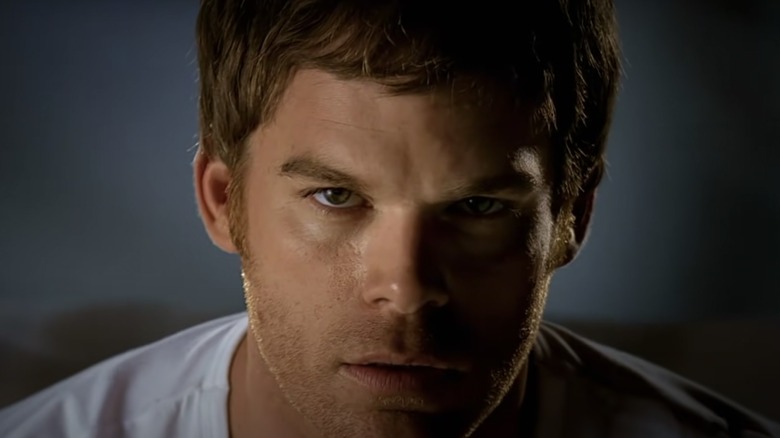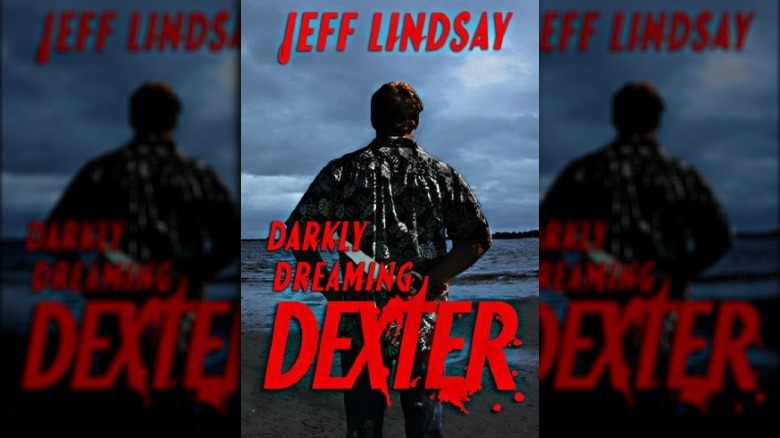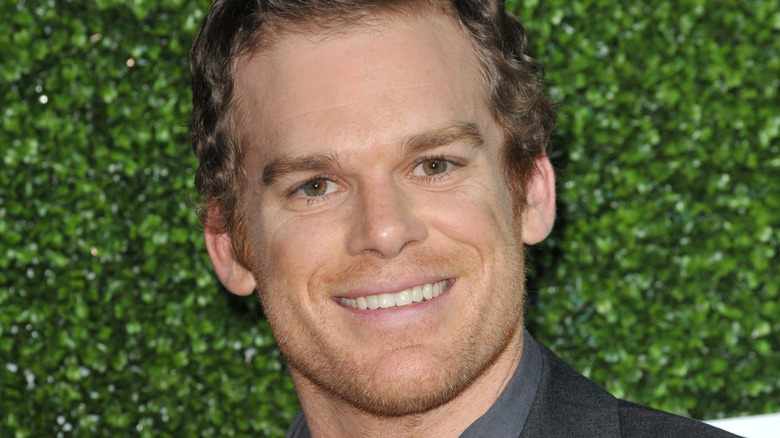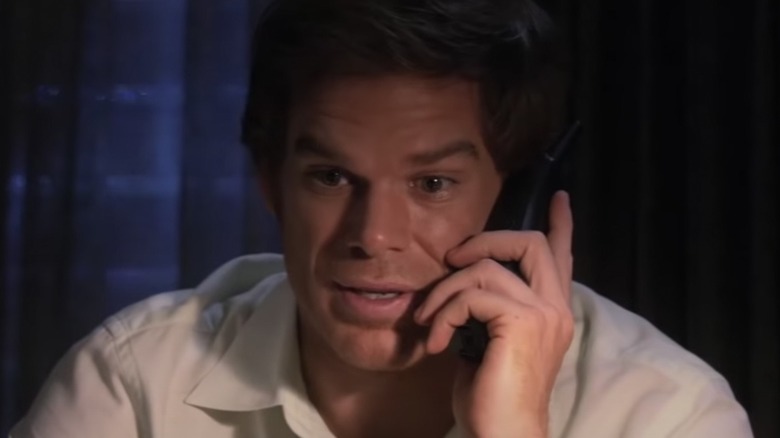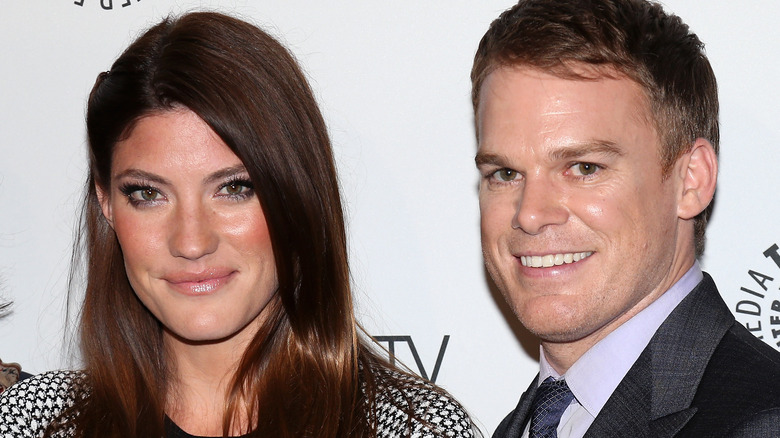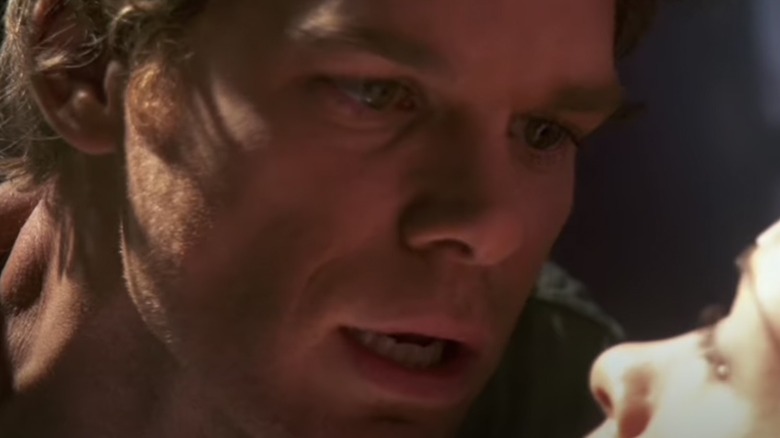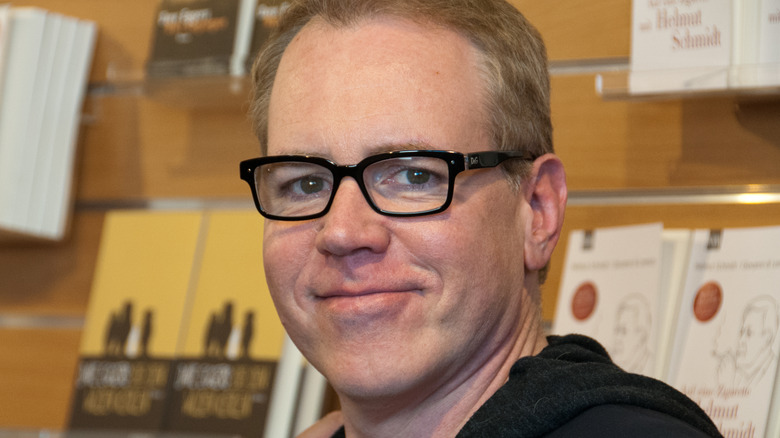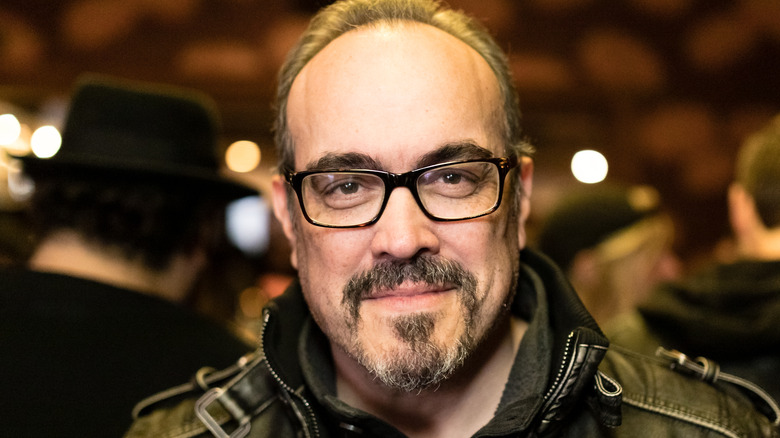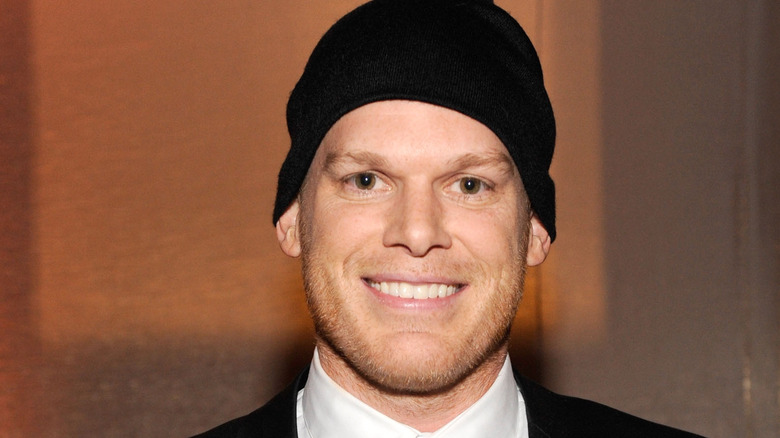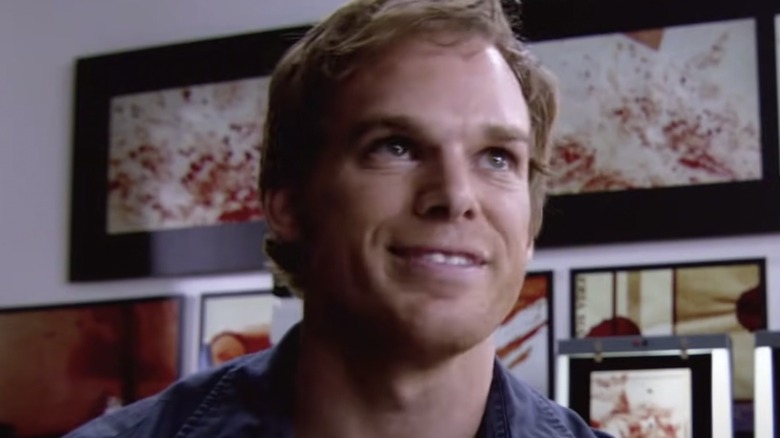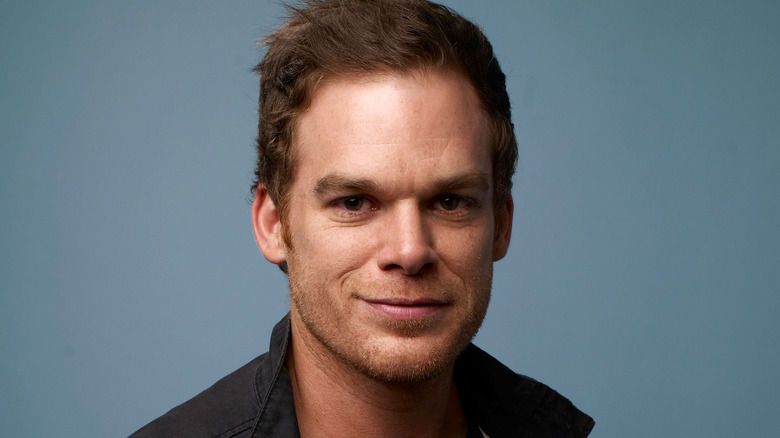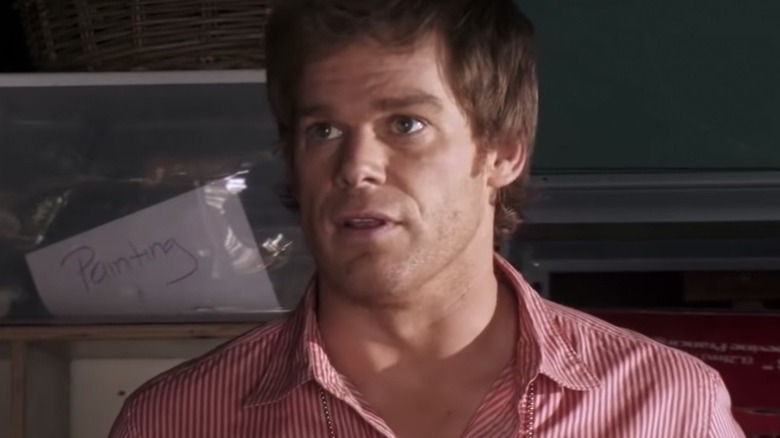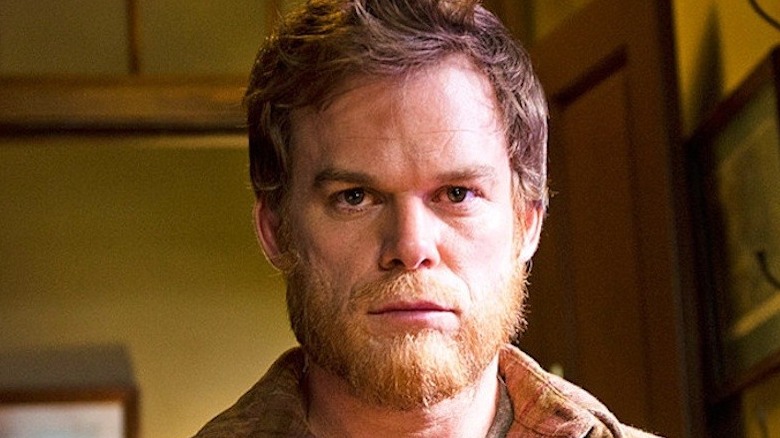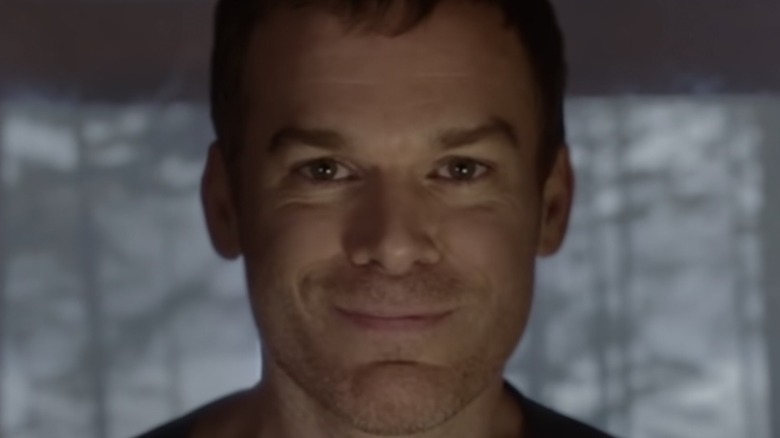The Untold Truth Of Dexter
One could argue that the age of "prestige television" began in 2006, when Showtime debuted "Dexter." Never before had TV audiences expected, or been ready to consume, a show in which the protagonist was a serial killer whose deadly acts were shown in full, graphic, bloody detail. But "Dexter" argued that it was okay to root for a murderer. Dexter Morgan, played by multiple Emmy Award nominee Michael C. Hall, was a blood spatter analyst with the Miami Metro Police Department, struggling to be a good, normal, and decent person but who also operated from a personal "code" instilled in him by his very accepting police detective father — Dexter got all that bloodlust out of his system by only killing those he judged to be truly evil. Over the course of eight seasons, those victims were usually other serial killers, just ones that didn't have a code.
Dexter Morgan traveled with his heinous secret, his so-called "Dark Passenger," over nearly 100 episodes and a lot of death and blood, forging relationships and bonds along the way while also somehow avoiding capture. Here's everything you may not know about "Dexter."
Dexter is very loosely based on a book series
Lots of popular TV shows, past and present, are based on novel series, among them "Outlander," "Game of Thrones," and "The Vampire Diaries." Count "Dexter" in the adaptation club too, but while those other examples are all extensions of wildly bestselling books, the Showtime serial killer show wasn't as well-known a title when it was selected for adaptation. Executive producer Sara Colleton decided to take a chance on developing the series when she came across Jeff Lindsay's first Dexter-based crime novel, "Darkly Dreaming Dexter." Oddly, she hadn't actually read the book before she worked on getting it made into a TV series. On an episode of Sundance Channel's "The Writer's Room" (via E! News) Colleton revealed that she was intrigued by a review of "Darkly Dreaming Dexter."
The first season of "Dexter" is inspired by the novel, which similarly follows a Miami blood spatter analyst named Dexter Morgan who secretly murders horrible criminals after being taught to do so by his ex-cop foster father. But the show's writers used up most of the material from the first book in the pilot episode, and that's where the show and source material veer away from each other. Lindsay ultimately wrote eight Dexter novels, which only bear a passing resemblance to their TV cousin.
Michael C. Hall almost didn't star on Dexter
For Michael C. Hall, playing Dexter Morgan just might be his signature role, the one for which he's best and most remembered. But before he started pretending to murder people, Hall had won attention — and an Emmy Award nomination — for his role as second-generation mortician David Fisher on HBO's funeral home drama "Six Feet Under." Hall said on an episode of Sundance Channel's "The Writers' Room" (via E! News) that he saw the "Dexter" pilot script "just a few months" after he finished up his five-year run on "Six Feet Under." He wasn't interested in another show, and certainly not one thematically similar to his previous one. "The last thing I thought I'd do was another television series," Hall said. "I didn't want to make another open-ended commitment to a character surrounded by dead bodies." But after reading the script (and Jeff Lindsay's "Dexter" source novel) he ultimately decided that it was too good a part to pass up.
Christian Camargo portrayed the primary villain in the first season of "Dexter," a murderer known as the Ice Truck Killer. Co-executive producer Michael Cuesta had a particular guy in mind: Jeremy Renner, at the time best known for playing serial killer Jeffrey Dahmer in the 2002 movie "Dahmer." "He wanted me to be in 'Dexter," Renner told Cloture Club of Cuesta. "I told him I can't do any other serial killer movies or TV shows." He almost took the role anyway, but had a scheduling conflict with "28 Weeks Later."
Dexter is named Dexter for a sinister reason
Writers name their characters what they do for lots of reasons. Maybe they just like the name, or a certain moniker just seems to suit the fictional person they created. And sometimes, the names of characters on TV shows are a multi-lingual web of intrigue full of secrets, Easter eggs, and hidden meaning. Dexter on "Dexter" was named by novelist Jeff Lindsay in this manner.
In Latin, the language of Rome and other ancient institutions, "dexter" isn't generally a first name but rather a word, and it means "right," or "right-handed." This means that the opposite of the right or the right hand, the left, has its own word in Latin, which made its way into English: sinister. While Dexter Morgan on "Dexter" certainly has a sinister side, what with all the secret murders, the word in this case refers to Dexter's "Dark Passenger," the nickname he gives to the personified aspect of his personality that drives him to kill and that he's constantly trying to suppress. Taking the metaphor all the way home, then, "Dexter" would be the "normal" personality that the character presents to others.
Dexter actually aired on regular TV
Showtime isn't just a cable television network, it's a premium, next-tier cable network that offers premium, next-tier programming. The channel doesn't have to adhere to strict content regulations of advertiser-funded, over-the-air television, and its number one competitor is HBO. That means shows with graphic, adults-only content, be it nudity, sexual situations, or, as is the case with "Dexter," extremely dark themes and murders in graphic, gory detail, both of which are important elements in depicting the continuing adventures of Dexter Morgan.
"Dexter" is one of the bloodiest, most violent, and most unsettling shows to ever air on premium cable, and yet, for a brief period, it actually ran on a broadcast network. In 2007 and 2008, the Writers Guild of America went on strike for more than three months. With nobody around to write them, more than 60 scripted television series shut down production, leaving the big networks with major holes in their TV schedules. With relatively tame crime-and-cop shows like "CSI" and "Criminal Minds" temporarily but extensively benched, CBS pulled content from its corporate sibling, Showtime. All 12 episodes from the first season of "Dexter" aired in a carefully but thoroughly edited form. This marked the first time in TV history a broadcast channel aired a whole season of a premium channel series.
A real-life couple portrayed brother and sister on Dexter
With the long hours on set, close quarters, and the fact that most people on TV are incredibly good-looking, it's amazing more on-set romances don't develop. Accordingly, two people in the cast of "Dexter" found love amidst the show's dark and haunting premise: Michael C. Hall, who portrayed title character Dexter Morgan, and Jennifer Carpenter, who played Debra Morgan, Dexter's sister and closest ally. Any notions that this is creepy should be dispatched with, because Hall and Carpenter aren't brother and sister in real life, of course. The general public didn't even know the two had been a couple for more than a year and a half until they showed up at the Golden Globes in January 2009, having eloped and gotten married just a few days prior, according to E! News. Just about three years later, Hall and Carpenter released a statement to Entertainment Weekly announcing that, after "having been separated for some time," they'd filed for divorce.
It was evidently an amicable enough split that Hall and Carpenter continued to work with each other on "Dexter" for a few more years. Still, art managed to imitate life when "Dexter" writers explored a romantic relationship between the brother and sister.
Dexter Morgan would be a frighteningly productive killer in real life
Over the course of 96 episodes and eight seasons, Dexter Morgan necessarily killed a lot of people. But how many lives, in total, did the character take in order to satisfy his dark and secret serial killing compulsion? The authors of the "Dexter's Kill List" page on a Dexter fan site carefully watched all episodes and tallied the number of victims by looking at the number of blood slides he kept in his souvenir box — one per kill. Many are named and identified, although some are not. All in all, Dexter had something to do with the death of at least 168 people.
A lot of those murders occurred within the show's Miami setting during the time frame of 2006 to 2013 (when "Dexter" originally aired). If Dexter had been a real person, he would have been one of most prolific murderers in Miami history. During the same period as the show, Miami witnessed between 59 and 79 murders annually. Proportionally, this would make Dexter responsible for 15 to 20 percent of all the city's murders.
Dexter loves Bret Easton Ellis, but the feeling isn't mutual
Showtime's "Dexter" isn't the first screen adaptation of a book about a handsome and unflappable young man whose demeanor hides a penchant for brutal murder. In 1991, Bret Easton Ellis published "American Psycho," his cult classic that satirized materialistic '80s culture and centered around an investment banker and probable serial killer named Patrick Bateman. In 2000, Christian Bale portrayed Bateman in the film version of "American Psycho," and references would pop up throughout "Dexter."
Dexter uses several aliases in his criminal activities, and he buys animal tranquilizers under the name "Patrick Bateman, M.D." When he schedules an appointment with a therapist, Dexter says his name is "Sean Ellis." Patrick Bateman's brother is named Sean, while the Ellis comes from Bret Easton Ellis.
Despite the homage, Ellis apparently isn't a "Dexter" fan. In 2012, he tweeted that he thinks the show "sucks big time," calling it a "high-concept cutesy serial killer drama" short on "depth and scares."
Before David Zayas played a Miami police officer, he served in the NYPD
Angel Batista is one of the few "Dexter" characters to appear in all eight seasons of the show and survive to the very end. He's a colleague and friend of Dexter Morgan, working at the Miami Metro Homicide Division first as a detective and eventually a lieutenant.
Actor David Zayas brought undeniable realism to his performance as Batista, as well as his many other roles as law enforcement officials. A relative latecomer to acting who landed his first TV role at age 33, Zayas previously served in the Air Force and then joined the force — all of which is to say that this TV cop was a member of the real-life New York City Police Department. "It was a time where there was a lot of violence in New York," Zayas told NPR's "All Things Considered." "It was pretty intense back then."
Reality and fiction blurred in another way for Zayas on the set of "Dexter." His stand-in on the series — the person matching his build used to set lighting and camera angles while the actor prepares — was Zayas' own son, to whom he reportedly bears a striking resemblance.
Michael C. Hall secretly faced cancer while shooting Dexter
In the midst of filming the fourth season of "Dexter" in 2009, star Michael C. Hall received some potentially frightening news: Doctors diagnosed him with Hodgkin's lymphoma, a type of cancer that attacks the immune system. Hall didn't take any time off of work, nor did he announce his situation to the "Dexter" cast or crew. Instead, he kept up with the rigors of filming the Showtime drama, and then received his first chemotherapy treatment for cancer the day after filming had wrapped for the season. "I thought, 'Well, I can treat this successfully and if my hair falls out I'll wear a wig during the fifth season — and I won't even have to share with anyone that this is happening,'" Hall told the Guardian.
Hall's hair did fall out, and when he attended the 2010 Golden Globes and Screen Actors Guild Awards, he did so with a knit cap on his head.
How Dexter made all that blood and guts look real
As a prop assistant and then prop master on "Dexter," Joshua Meltzer worked hard to bring to life the many gruesome things dreamed up by "Dexter" writers. For the "Angel of Death" murder, for example, a tripwire releases a device that stabs a woman, raises her arms into a wing formation, and releases a biblical plague of locusts. According to Vulture, Meltzer rejected an idea to use a small number of locusts and multiply them digitally, opting to go full CGI on that, and then spent his efforts on the murder, which involved building a mechanical device to mock-kill the actor playing the woman."She actually was on a custom-made teeter-totter, and when we tripped the wire, she rose up, and her hands went up, and there was a blood squib on her that fired, and the blood flowed."
As for the numerous gallons of fake blood used on "Dexter," Meltzer had his own recipe. "The industry standard is that all liquid blood is a syrup base; what kind of syrup you use is where you get into your secret formulas," he said. His consisted of a "special syrup" as a base, to which he added food coloring and a dash of dish soap "because it helps with the cleanup." If the scene was to be shot outside, he'd also add peppermint oil. "Bees hate peppermint, so you won't have any bee problems."
Playing a creep required creepy preparation for Michael C. Hall
Between the time he was officially cast as "Dexter" and when the show began shooting, actor Michael C. Hall enjoyed the luxury of a substantial period of time to prepare for the unique role of Dexter Morgan, a serial killer who only kills horrible people. Hall went through many of the traditional and informative methods actors employ for a role, like watching documentaries about serial killers and reading books about serial killers written by FBI profilers. But he still felt like he needed to feel what being a stalking murderer searching for their prey might be like. "I would go out by myself in New York and try to find someone who was also alone, maybe go to a restaurant with a bar," Hall said on "George Stroumboulopoulos Tonight." "And I would watch them finish their meal and endow them with all kinds of reprehensible characteristics, a potential victim for Dexter." Then Hall would quietly but intensely follow his target through the streets of New York, staying "a block or so" back.
Real-life murderers were inspired by Dexter
"Dexter" provided a gritty, realistic, well-rounded portrait of a serial killer, making for a show rich with complex characters and a thorough exploration of the absolute darkest side of humanity. However, the fictional murders committed by the fictional Dexter Morgan may have led to real-life killings. In 2009, according to the New York Daily News, Indiana teenager Andrew Conley turned himself in to police and admitted strangling his brother to death. He claimed to have thought about committing a murder for years and felt "just like" Dexter Morgan, in that he was compelled to do so.
In 2014, an English teenager reportedly very into "Dexter" stabbed his girlfriend to death, then disposed of the body with tree-trimming tools. He soon thereafter confessed to his sister that "Ed made me do something bad," tragically mirroring the relationship between Dexter Morgan and his "Dark Passenger."
There's also Mark Twitchell, a "Dexter" devotee who made a "Dexter"-esque fan film and posted as "Dexter Morgan" on social media. In 2011, Twitchell, who planned an elaborate "kill room," was convicted of first-degree murder.
Showtime wouldn't let Dexter writers end the show the way they wanted
In 2013, "Dexter" ended with one of the most anticipated — but also memorably unimpressive and hated — series finales ever. Would his numerous crimes finally catch up to him? Would he be stopped by his colleagues in the Miami Police Department in a bloody showdown before he could kill again, thus finally ending the murder spree of an unimaginably violent but also terribly conflicted and complex criminal? Not exactly. Instead, Dexter escaped capture, directed his boat into a hurricane, faked his death, and started life over under a fake name as a lumberjack in the Pacific Northwest.
That logical, climactic ending where Dexter meets his fate is how the show's creative team wanted to end "Dexter" after eight years. "They won't let us kill him," "Dexter" producer John Goldwyn told Vulture. "Showtime was very clear about that. When we told them the arc for the last season, they just said, 'Just to be clear, he's going to live.'" In an interview with E! News, former "Dexter" showrunner Clyde Phillips said he had his own final scene in mind to that end. "Dexter's opening his eyes and he's on the execution table at the Florida Penitentiary," Phillips said, adding that Dexter then looks into the observers' room and sees all the people he killed.
Dexter will live to kill again
There turned out to be a silver lining to Showtime preventing "Dexter" writers from killing off Dexter Morgan in the series finale: The show could one day see a revival. In 2020, seven years after "Dexter" aired its last episode, Showtime ordered 10 new episodes, to be presented as a limited series. Star Michael C. Hall signed on to once again play Dexter Morgan (or whoever Dexter Morgan is posing as in order to evade capture and punishment for his many murders) while the series' original executive producer Clyde Phillips agreed to serve as showrunner.
In April 2021, Showtime unveiled a teaser trailer for the "Dexter" finite revival and announced that it would air the following fall. Plot details are scant, but the episodes will find Dexter Morgan hiding out in the small town of Iron Lake, New York, where a mystery will ensnare the mayor (Clandy Brown), the chief of police (Julia Jones), and a true-crime podcast host (Jamie Chung).
